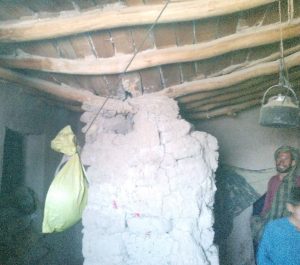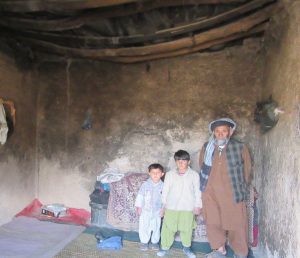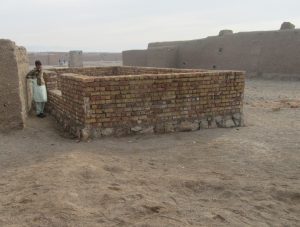Access for Security of Tenure- Hope for a Better Future
UN- Habitat supports Internal Displacement People/families in three strategic Afghan cities; Herat, Kabul and Nangarhar under Local Integration of Vulnerable Excluded & Uprooted Programme (LIVE-UP). The programme is funded by European Union and started in early 2015.
Maslakh is formally one of the largest IDP settlements in the world, at one point with an estimated population of 19,350. Maslakh is a dry place located far from the central part of the Herat city. Surveys undertaken by UN- Habitat show that almost all IDP families, most of whom have lived in Maslakh for more than 15 years, , live in makeshift shelter , These substandard homes are made of mud and many are uncovered houses or have uncovered rooms.
During the survey our team entered into a house. It was a house just by name. You could not see any wall around the yard; in some parts the crack of the wall was visible. The rain and wind had eroded the sand and only the pebbles were visible. The wind carried the dust, small pieces of plastics and the brushwood from one side to the other side. At the end of the yard there was a destroyed building that the wind blew through. It had an unstable ceiling, hence the walls were about to fall down. The cracks were visible in the all parts of it. There was a way to the room but it did not look as a real door there was only a wooden frame even without a curtain to prevent the insects to fly inside the room. Instead of the window there were two narrow holes through which light inter.
We stepped further; our glance attracted by an old man, who was unable to stand. He was Hezbullhah, who lived with his wife and eight children in this destroyed house. He welcomed us in. We could not find a suitable place for sitting. There was a small girl laying in the corner of the room; the illness was visible on her innocent face. It seems her illness is because of the hot weather and unclean environment. The insects were flying around her. The dust blew through the door and the two holes.
Then the old man greeted us and said, “As you see we don’t have any stable home or a surrounding yard. I worry about my children who are in this harmful place. During the rainy season we cannot go inside, because the ceiling might fall down. The rain comes inside from the ceiling’s cracks. It has eroded the sand from the roof. During snowy days, it becomes extremely cold and the wet and cold room causes lung disease for my children”.
He added, in hot summer my children get sick due to sun heat and unclean environment. Dysentery, diarrhea, sore throat, vomit and other chronic disease are common in the hot weather. I am a disabled man; I have lost my hand and one of my legs in the war, so I am not able to rescue my children from this miserable life.
The small children are suffering from the sun, wind, dust, rain, snow and other natural phenomenon due to our poor housing conditions. The sun shines directly on the tents and uncovered rooms in the summer. In the same way the cold air in winter make the life difficult for people. Also, Maslakh is a mountainous and dry place and the harsh winds that create challenges for the people who lack appropriate shelter.
The communities in Maslakh were mobilized through the 15 step ‘People Process’ with the establishment of Community Development Councils (CDCs). The CDCs suggested establishing shelters for needy families, the families who are poorest of the poor with no shelter or their shelters are destroyed. The Programme targets to establish 1,000 shelters in three provinces and 250 of these shelters will be established for Maslakh families in Herat including house for Hezbullhah with the help of community. The programme improves the living condition and enhance tenure security of IDPs through providing government “permission to stay” in the area. The Programme aims to support the re-integration of Afghan returnees and IDPs into society based on community approach which promotes quick, efficient and transparent implementation, and building the capacity of local authorities to take an active role in replication and expansion of settlements improvement.




